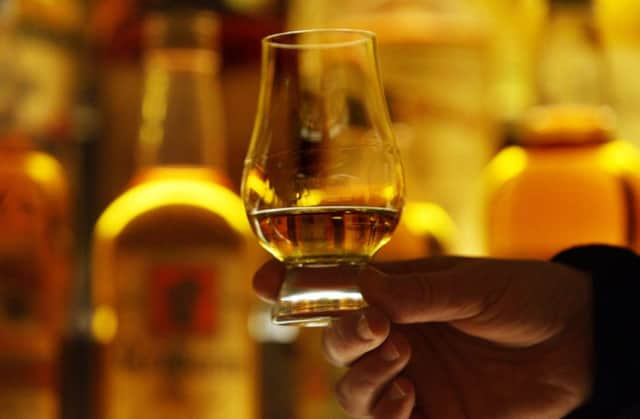Budget 2015: How Scotland fared
This article contains affiliate links. We may earn a small commission on items purchased through this article, but that does not affect our editorial judgement.


The Chancellor also had good news for the Scotch whisky industry in the last Budget of this parliamentary term, announcing a 2 per cent cut in duty, a move hailed as “historic” by the Scotch Whisky Association.
In a blatantly political Budget, its sights firmly set on wooing voters ahead of the general election in seven weeks, Mr Osborne painted a rosy picture of a post-austerity Britain, promising “sunshine” for hard-pressed taxpayers and a reduction in the national debt.
Advertisement
Hide AdAdvertisement
Hide AdBritain could “walk tall again”, he said, as he announced that the period of austerity that has dominated the coalition government’s time in office would end a year earlier than forecast.
“The hard work and sacrifice of the British people has paid off,” Mr Osborne told MPs. “We will end this parliament with Britain’s national debt share falling. The sun is starting to shine – and we are fixing the roof.”
However, Labour leader Ed Miliband said there had never been such a large gap between the Chancellor’s rhetoric and the reality of people’s lives. “This is a Budget people won’t believe from a government that is not on their side,” he said.
Although the Treasury had insisted this was not going to be a giveaway Budget, the Chancellor did have a number of handouts up his sleeve, including the removal of tax from 95 per cent of all savings and a new high-interest savings account for first-time house buyers to save for a deposit, with a 25 per cent top-up from the government.


Delivering his £1.3bn package of tax breaks for the oil and gas industry, Mr Osborne said it would provide the North Sea with a 15 per cent boost at a time of tumbling oil prices and reduced investment.
He went on: “It goes without saying that an independent Scotland would never have been able to afford such a package of support.”
Last night, industry leader Sir Ian Wood, founder of the Wood Group, said the Budget provided an “essential lifeline” from the Treasury that would allow the sector to start rebuilding. He said support from the government would mean fewer job losses – between 5,000 and 10,000, compared with the 80,000 he had forecast would be lost over the next two to three years.
In a post-Budget briefing, Lib Dem Scottish Secretary Alistair Carmichael also welcomed support for the industry, saying it would “save thousands possibly tens of thousands of jobs”.
Advertisement
Hide AdAdvertisement
Hide AdOther Budget elements for Scotland included help for veterans’ charities for soldiers who served in Afghanistan and Iraq, along with money for the air ambulance service north of the Border and £3.5 million for Edinburgh West MP Mike Crockart’s UK scheme to tackle nuisance callers.
As he outlined an end to austerity, Mr Osborne said this was due to a £35bn windfall from reduced debt interest payments and £22bn from selling off shares in Northern Rock, Bradford and Bingley and Lloyds.
“Because the national debt share is falling a year earlier than forecast in the Autumn Statement, the squeeze on public spending ends a year earlier too,” he told MPs. “In the final year of this decade, 2019-20, public spending will grow in line with growth of the economy. We can do that while still running a healthy surplus to bear down on our debt.”
In a pitch to voters, the Chancellor said Britain was facing a “critical choice” and he highlighted what he called the government’s economic successes. “Today I report on a Britain that is growing, creating jobs and paying its way. We took difficult decisions in the teeth of opposition and it worked,” he said.
Moving on to personal finance, the Chancellor signalled more income tax cuts, raising the threshold at which it is paid to £10,800 next year and £11,000 in 2017-18.
He also announced that, under a new personal savings allowance, the first £1,000 earned in interest would be tax-free – abolishing savings tax for about 17 million people.
“People have already paid tax once on their money when they earn it. They shouldn’t have to pay tax a second time when they save it,” Mr Osborne said.
Scottish finance secretary John Swinney criticised the Chancellor for failing to ditch austerity measures immediately.
Advertisement
Hide AdAdvertisement
Hide Ad“The Chancellor had every opportunity to end the damaging cuts from the UK government and has instead turned his back on investment in public services,” Mr Swinney said.
“We face the same £30bn of unfair and unnecessary cuts today as we did yesterday. That is despite the clear admission from the Chancellor that there is headroom to invest to protect our public services.”
He added: “If we are to believe the Chancellor that the economy is making such a successful recovery, then there is no justification for the destructive cuts that impact on the most vulnerable in society. That tells you everything you need to know about the values and priorities of this Chancellor.”
Shadow chancellor Ed Balls said Mr Osborne would be able to reduce debt only by intensifying the spending squeeze over the next three years. He said it would almost certainly require Mr Osborne to impose cuts on the NHS or to increase VAT.
Ukip leader Nigel Farage said the government had failed in its promise to the British people to eradicate the deficit. “Mr Osborne talks about a long-term economic plan. Today he pushed all his targets back and created a long-grass economic plan,” he said.
However, John Cridland, director-general of business organisation the CBI, said the Budget offered a “clear plan for fiscal health and growth” with “encouraging measures to help businesses create jobs for the benefit of all”.
Significantly, the Chancellor used his Budget to spike the guns of his Labour and SNP critics by announcing that, despite claims public spending would reach its lowest share of GDP since the 1930s – pre-NHS – it would actually be higher than it was in 2000 following Gordon Brown’s Budget that year.
In a surprise move, instead of cutting inheritance tax for the wealthy, which his opponents had predicted, the Chancellor announced a review of “deeds of variation”, which are used to avoid the levy – allegedly by Mr Miliband, among others.
Advertisement
Hide AdAdvertisement
Hide AdWith his help for the oil industry, Mr Osborne pointed out that revenues were just 10 per cent of the figure predicted by the SNP Scottish Government in its independence white paper.
In a rare light-hearted moment, Mr Osborne mocked the Nationalists and Labour as he announced £1m to celebrate the 600th anniversary of England’s victory at the Battle of Agincourt.
He said: “The Battle of Agincourt is when a strong leader defeated an ill-judged alliance between the champion of a united Europe and a renegade force of Scottish nationalists.”
FOLLOW US
SCOTSMAN TABLET AND MOBILE APPS